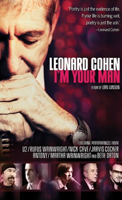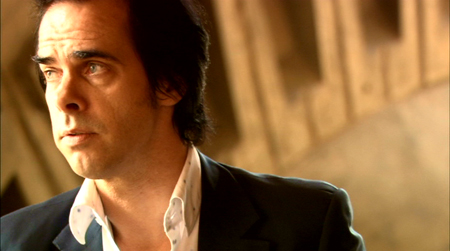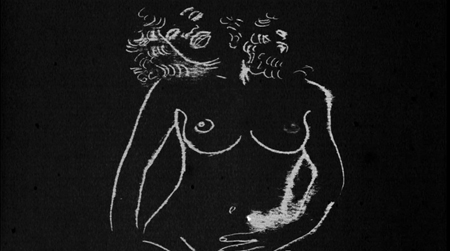 BUY ME AT AMAZON: CLICK HERE!
BUY ME AT AMAZON: CLICK HERE!
STUDIO: Lionsgate
MSRP: $27.98
RATED: PG-13
RUNNING TIME: 103 min
SPECIAL FEATURES:
• Feature commentary w/ director Lian Lunson
• Additional musical performances
• Extended interview with Leonard Cohen
The Pitch
"You
got your music in my poetry! You got your poetry in my music! You got your
tired jokes in my CHUD.com!"
The Humans
Leonard
Cohen, and a small host of musical guests, including Rufus Wainwright, Jarvis
Cocker,
The Nutshell
Director
Lian Lunson combines performance and biography of the titular poet to educate
and celebrate a life of top-notch creative output.
The Lowdown
A bit of
background on Leonard Cohen, for the uninitiated, since the film doesn’t do
much to give a historical grounding: he’s a Canadian, rose to prominence in the
60s, and holds the enviable distinction of being an accomplished poet, singer,
songwriter, and novelist. His songs have been recorded, covered, and performed by
many fine artists. You’ve probably heard Jeff Buckley’s pretty little version
of Cohen’s "Hallelujah," and I have little doubt you’ve heard the
same song misplaced in Shrek.

"I know Wings of Desire sounds like a soft porn. It wasn’t my idea.
I was just in the band, man."
In other
words, he’s a poet you’ve heard, even if you haven’t heard of him. It’s
something of an unusual state for a modern poet to be in. Generally, where
poetry is concerned, either you’re in with the crowd, or you aren’t even
exposed to their madness. It’ll take a few decades before the more enduring
turns of phrase enter wide vocabulary. Cohen, on the other hand, is one of them
boundary-crossers that you hear tell about. His books of poetry may not be as
well-known as his songs, but his songs are of a lyrical quality that
distinguishes them from the larger mass of pop music.
Poems and
songs are not entirely analogous, of course. The difference most important here
is that songs are meant to be performed and heard aurally, where poems are kind
of indifferent. Cohen’s willful participation in an art form more based on
performance sets him apart from his contemporaries in the poetry world, whose
poems are distributed on paper, rather than vinyl.
Hearing
Cohen recall not only his songwriting and performing, but also his poesy and
fiction, one gets the impression that his most productive years must have been
exhausting. In one of the interview segments, Cohen himself addresses this.
"If it is your destiny to be this laborer, called a writer, you know you
have to go to work every day," he says. This is at once a heartening
message to aspiring writers and a potentially discouraging one. Your effort is
rewarded, says Cohen who stands as living proof. Your effort is entirely
necessary, also. When words and music sound inspired, it’s a pretty good
indication that they weren’t. Some of the other interviewees mention that Cohen
had worked for years on certain songs, perfecting them before he was satisfied.

Dustin Hoffman has secretly been playing Cohen in public appearances since 1967.
All those
years of effort have had an interesting effect on Cohen. For one thing, they
led to his adopting the lifestyle, and eventually the mantle, of Zen Buddhism. In
this mode, he speaks of his past with a calm detachment, claiming a personal
lack of nostalgia, as well as a distance from his own history. At one point he
mentions to Ms. Lunson that during your life you realize that you "cease
to be the hero of your own play," and that "you abandon your
masterpiece and you sink into the real masterpiece." It’s a dissonant
thing, hearing words of such tender resignation from a man whose life’s output
is so wide and deep.
It’s also
tremendously humble. If nothing else comes through from this documentary, it’s
Cohen’s humility. He sure as hell has enough to be proud of, but he doesn’t
applaud his own cleverness, nor does he pull a Whitman and celebrate himself. When
he speaks during his interview segments, it’s with a touching and unaffected
self-deprecation — not in the pursuit of gentle humor, but in what seems to be
pure honesty. In a recent preface to a Chinese translation of one of his books
of poetry, he concludes with the words: "Dear reader, please forgive me if
I have wasted your time."
At times,
on a gut level, Cohen’s attitude maddened me. Here he is, creator of some of
the most beautiful passages in modern music, possessing a modesty that he
needn’t own if he doesn’t want to. Other times, I was convinced absolutely of
the lack of falsehood in that modesty, which summons of a sense of admiration.
He worked hard as a writer. It paid off in volume and content. That’s what it
was supposed to do. (Incidentally, it’s also hard not to admire a writer whose
childhood heroes were the population of the Marvel universe.)

Sometimes a thousand words are worth more than a picture.
I’ve
focused on Cohen’s own depictions of himself, which is kind of misleading for
the film, since it revolves mostly around perceptions of his character by other
people. The interview segments serve as interstitials between lovely
performances of Cohen songs by a wealth of talents at a single live tribute
show. The songs themselves are placed perfectly to support the memories and
observations (most of which are enlightening, full of admiration, or both).
The
performances are well-shot and sound perfect, which means that the film
functions well as a sort of concert film as well as a biography. I found myself
looking forward to each musical segment. Partly, that’s because the
performances are range from competent to incredible. My favorites artists were
easily Martha Wainwright, who really ought to do some stuff with Joanna Newsom,
and
distracted air is so charmingly in contrast to his otherworldly vocal control
that you can’t help but be fascinated.
The
lasting impression surrounding I’m Your Man is something like a
mutual admiration society. The film features an anthology of talent, all
gathered under the unifying umbrella of Cohen’s work, but well-accomplished in
their own rights. It’s a joy to see so many people demonstrate the skills they
have labored over, and it’s an education to witness the downplayed genius of a
living legend.
The Package
Director
Lian Lunson provides a charming feature commentary that is chiefly concerned
with the process of assembling the film. She scales back her comments during
the musical performances, which is something of a shame because that’s a
significant portion of the running time. Still, she’s a pleasure to listen to,
thanks to her enthusiasm.
There are
also some additional performances of Cohen’s song, and an extended cut of the
lovely interview between Lunson and Cohen.
7.9 out of 10